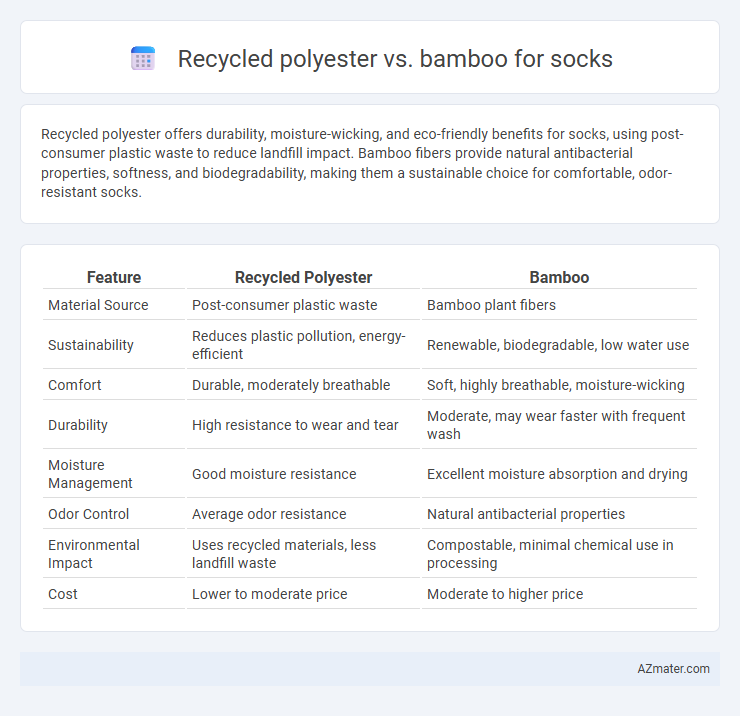Recycled polyester offers durability, moisture-wicking, and eco-friendly benefits for socks, using post-consumer plastic waste to reduce landfill impact. Bamboo fibers provide natural antibacterial properties, softness, and biodegradability, making them a sustainable choice for comfortable, odor-resistant socks.
Table of Comparison
| Feature | Recycled Polyester | Bamboo |
|---|---|---|
| Material Source | Post-consumer plastic waste | Bamboo plant fibers |
| Sustainability | Reduces plastic pollution, energy-efficient | Renewable, biodegradable, low water use |
| Comfort | Durable, moderately breathable | Soft, highly breathable, moisture-wicking |
| Durability | High resistance to wear and tear | Moderate, may wear faster with frequent wash |
| Moisture Management | Good moisture resistance | Excellent moisture absorption and drying |
| Odor Control | Average odor resistance | Natural antibacterial properties |
| Environmental Impact | Uses recycled materials, less landfill waste | Compostable, minimal chemical use in processing |
| Cost | Lower to moderate price | Moderate to higher price |
Introduction to Eco-Friendly Sock Materials
Recycled polyester and bamboo are leading eco-friendly sock materials known for their sustainable properties. Recycled polyester is produced from post-consumer plastic waste, reducing landfill impact and conserving resources. Bamboo fibers offer natural antimicrobial qualities and biodegradability, making both materials excellent choices for environmentally conscious consumers.
What is Recycled Polyester?
Recycled polyester is a sustainable fabric made from repurposed plastic bottles and industrial polyester waste, reducing landfill and ocean pollution. This material offers durability, moisture-wicking properties, and quick-drying performance, making it ideal for socks. Compared to bamboo, recycled polyester provides enhanced elasticity and resistance to wear and tear, suited for active and long-lasting sock use.
Understanding Bamboo Fiber
Bamboo fiber, derived from the cellulose of bamboo plants, offers natural antibacterial properties and excellent moisture-wicking capabilities, making it ideal for socks. Unlike recycled polyester, bamboo is biodegradable and environmentally friendly, reducing plastic waste and promoting sustainable fashion. Its softness and breathability enhance comfort, while the renewable growth cycle of bamboo supports eco-conscious consumer choices.
Environmental Impact: Recycled Polyester vs Bamboo
Recycled polyester, derived from post-consumer plastic waste, significantly reduces landfill accumulation and energy consumption compared to virgin polyester, but its production still involves microplastic pollution concerns. Bamboo fibers are biodegradable and require less water and pesticides than traditional cotton, making them a more sustainable option; however, bamboo processing often involves chemical treatments that can harm the environment if not managed properly. Choosing between recycled polyester and bamboo for socks depends on balancing lower resource use and biodegradability against potential chemical impact and microplastic release.
Comfort and Breathability Comparison
Recycled polyester offers excellent moisture-wicking properties and durability, making it a popular choice for socks focused on long-lasting wear and quick drying. Bamboo fiber excels in breathability and natural antibacterial traits, providing superior softness and odor control for enhanced comfort during extended use. Comparing comfort and breathability, bamboo socks typically feel softer and allow better airflow, while recycled polyester socks are more resilient and efficient in moisture management.
Durability and Longevity
Recycled polyester socks exhibit high durability due to their synthetic fibers, which resist wear, moisture, and stretching, extending their lifespan significantly compared to natural fibers. Bamboo socks, while naturally antibacterial and soft, tend to wear out faster because bamboo fibers degrade quicker under friction and frequent washing. Choosing recycled polyester enhances sock longevity for heavy use, whereas bamboo offers comfort but requires more frequent replacement.
Moisture-Wicking and Odor Control
Recycled polyester excels in moisture-wicking due to its hydrophobic properties, effectively pulling sweat away from the skin and promoting faster evaporation, which keeps feet dry during intense activities. Bamboo fibers naturally possess antibacterial agents like bambusin, providing superior odor control by inhibiting bacterial growth that causes smells. While bamboo offers excellent breathability and odor resistance, recycled polyester's durability and moisture management make it a preferred choice for high-performance socks.
Cost Effectiveness and Availability
Recycled polyester socks offer higher cost-effectiveness due to lower production expenses and widespread availability of recycled materials, making them more affordable for mass-market consumers. Bamboo socks, while sustainable and naturally antimicrobial, tend to have higher manufacturing costs and limited raw material supply, resulting in increased retail prices. The extensive supply chain infrastructure for recycled polyester ensures consistent availability, whereas bamboo's cultivation and processing constraints may impact stock reliability.
Which Material is More Sustainable?
Recycled polyester socks reduce plastic waste by repurposing PET bottles, conserving energy and water compared to virgin polyester production. Bamboo socks offer natural biodegradability and require less water and pesticides during cultivation, but some manufacturing processes involve chemicals that impact sustainability. Evaluating life cycle assessments, bamboo fibers generally present a lower environmental footprint if processed mechanically rather than chemically, making bamboo socks potentially more sustainable depending on production methods.
Final Verdict: Best Choice for Eco-Conscious Consumers
Recycled polyester socks offer superior durability and moisture-wicking properties, making them highly efficient for active lifestyles while reducing plastic waste. Bamboo socks provide natural antibacterial benefits and exceptional softness with a low water footprint, promoting sustainable comfort. For eco-conscious consumers prioritizing environmental impact and performance, bamboo socks emerge as the best choice due to their renewable sourcing and biodegradability.

Infographic: Recycled polyester vs Bamboo for Sock
 azmater.com
azmater.com